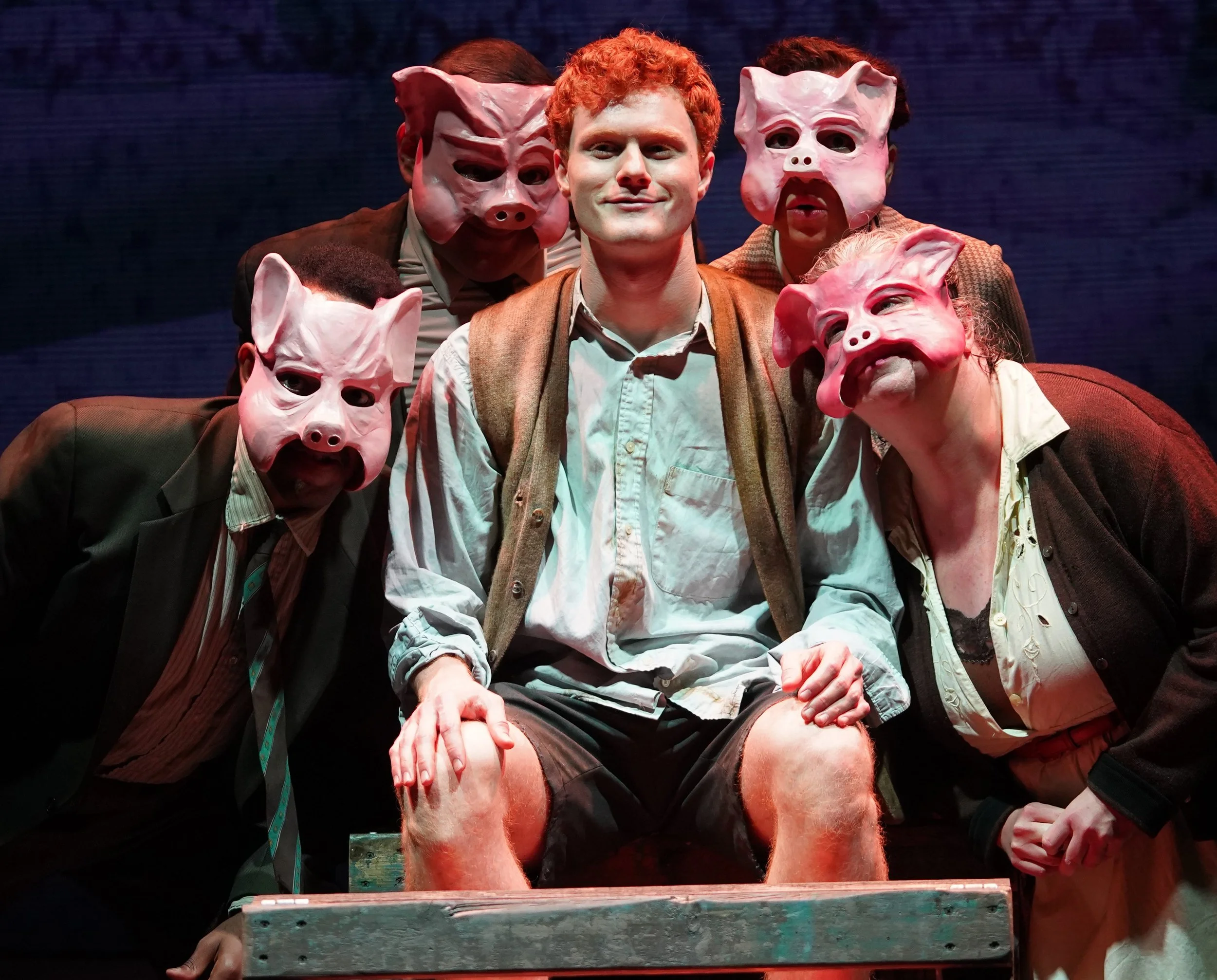Nicholas Barasch’s Francie charming his Ma (Andrea Lynn Green) in The Butcher Boy.
Whoa! At the ends of both acts of The Butcher Boy, the Irish Rep’s new musical adapted from Patrick McCabe’s 1992 novel, such unsettling things happen that you’re forced to revisit everything that preceded them, assessing how much was fact, how much was fantasy, and whether or not we should trust our narrating protagonist, Francie Brady (Nicholas Barasch, and we shouldn’t). The Butcher Boy isn’t comforting or reassuring or lovable, and it won’t send you out whistling a happy tune. But—and this puts it ahead of much of the current pack—it isn’t stupid.
The book, music, and lyrics, all the work of one Asher Muldoon—an undergrad at Princeton!—are faithful to McCabe, and to Neil Jordan’s 1997 film adaptation, with a couple of episodes and plot points missing. It’s not that easy to tell from Charlie Corcoran’s undernourished set, but, as the giant portable-TV backdrop implies, the time is the early 1960s, in a small town in Ireland. The 13-year-old Francie, the only child of an alcoholic father (Scott Stangland) and a loving mom who’s edging toward madness (Andrea Lynn Green), is bright, curious, and charming when he needs to be. But in this dull town and with his dysfunctional family, he’s retreating increasingly into a world of his own. He dreams of a worry-free existence with his best friend Joe (a smooth and convincing Dan Macke, subbing for Christian Strange at the performance I saw). Francie escapes into comic books and TV: westerns and The Twilight Zone and such. And he sees pigs. They’re his demons. They haunt and taunt him, and indulge in perhaps one production number too many.
Francie invades a Dublin household and flirts with the owners’ daughter (Kerry Conte).
The pig-Francie interaction is confusing at first, with the problematic hero confronting a chorus in pig masks. Director Ciarán O’Reilly might have worked harder on differentiating the inner workings of Francie’s mind and the exterior action. What’s clear is that Francie is not to be trusted. He’s abusive to schoolmate Phillip Nugent (Daniel Marconi) and Phillip’s judgmental mom (Michele Ragusa). Phillip, timid and passive, is always friendly, always forgiving—though it’s a character arc that’s hard to buy. He also has a confident alter ego, a song-and-dance kid in a spangled tuxedo. It gives Marconi a chance to strut his stuff, but it’s a digression; this is Francie’s story, not Phillip’s.
Francie hitchhikes to Dublin and lies his way into a respectable middle-class household, where he flirts with the kindly couple’s daughter (Kerry Conte). There, his father finds him (it’s not clear how) and drags him home, where his mother has drowned herself, and where Francie perpetrates a gruesome act on Phillip’s mother that lands him in “the garage,” an asylum, for three years. Liberated, he becomes an actual butcher’s apprentice, working for a gruff pig slaughterer (David Baida) who comes to appreciate Francie’s way with a knife.
There’s more violence and madness, with Francie attempting to sabotage Joe’s growing friendship with Phillip, dangerously deluding himself about his dad, and committing one more horrible act upon Mrs. Nugent, one that left the audience shocked and disinclined to give Barasch the standing ovation he’d clearly earned. There’s a subplot, too, about Francie’s well-meaning uncle (Joe Cassidy) and his long-suffering sweetheart (Conte), but it exists mainly to accent the conflict and unhappiness in the Brady family.
Francie surrounded by his demons in The Butcher Boy. Photographs by Carol Rosegg.
What kinds of songs do you tell this sad story with? Muldoon’s music isn’t what you’d call hummable, but it’s characterful, as Irish as soda bread, and energetically played by the “Slaughterhouse Five,” a lilting orchestra behind that TV backdrop, energetically conducted by David Hancock Turner. M. Florian Staab’s sound design is unusually clear; it’s hard to tell whether the actors are wearing mics at all. And Kat C. Zhou’s lighting helps distinguish the real from the unreal. Barry McNabb’s choreography is largely kick-step-kick, but then, it can’t be easy to choreograph pigs.
Muldoon, as is the trend among playwrights these days, tells more than he shows; roughly a third of the text is Francie’s narration, and he’s such an unreliable source, the fantasy-reality lines become highly blurred.
The Butcher Boy is not an easy sit, and I’m not even sure how much I liked it. But in a musical environment where so much product is by-the-numbers jukebox affairs, or sloppy adaptations of old movie hits, or pale imitation Sondheim, here’s something that’s challenging, that stubbornly thrusts a vastly unlikable hero in our faces and dares us to try to understand him. It doesn’t coddle, and the violence and strife aren’t mere song cues, they’re endemic to the landscape. This is adventurous, confrontational work, and the theater needs more of it.
The production of The Butcher Boy at Irish Repertory Theatre (132 W. 22nd St., Manhattan) runs through Sept. 11. Evening performances are at 7 p.m. Wednesday, Thursday and Saturday and at 8 p.m. Friday; matinees are at 2 p.m. Wednesday and Saturday and at 3 p.m. Sunday. For tickets, visit irishrep.org.





